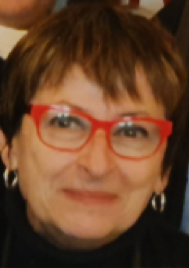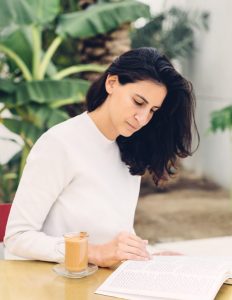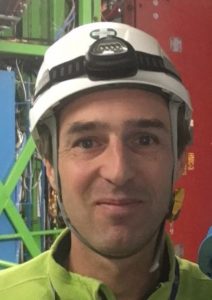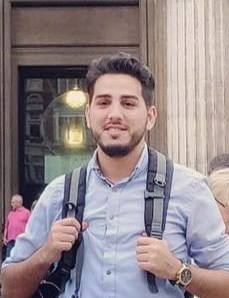Achille Stocchi
He created the biannual Workshop CKM in 2002, co-created the TESHEP annual school in 2007 and co-created the WISHEPP annual school in Palestine wth collaboration with An-Najah National University.
Marie-Hélène Schune
In parallel to her research, she has been active in teaching Particle Physics at the Master-2 level and was responsible of the Master-2 NPAC, a joint program of the Paris universities.
Florent Robinet
After a Ph.D. thesis in hadronic physics (COMPASS experiment at CERN), Florent Robinet joined the Laboratoire de l’Accélérateur Linéaire in Orsay, France (Univ. Paris-Sud CNRS/IN2P3, Université Paris-Saclay) in 2009, first as a post-doc then as a CNRS physicist. Florent Robinet is working on gravitation and cosmology and is an active member of the Virgo collaboration. He is mostly involved in data analysis work, searching for gravitational waves produced by hypothetical objects called cosmic strings. He is also developing new search methods to better separate un-modelled transient signals from noise in the LIGO-Virgo data. Another important aspect of Florent Robinet’s work is about characterizing the noise of the Advanced Virgo detector: he is coordinating the Virgo detector characterization group and developing analysis tools to detect and characterize noise transients in the detector. Since 2017, Florent Robinet joined the SVOM consortium and designs the MXT X-ray telescope which will equipped the SVOM satellite. He is responsible for the development of the on-board scientific software used to locate gamma-ray bursts.
Giacomo Graziani
David Rousseau
Frédéric Machefert
Frédéric Machefert is a researcher in HEP and belogns to LAL LHCB experiments ince years, He is lecturing in many masters and internatioanl school, supervises many thesis and PhD
Abdenour Lounis
Abdenour Lounis is member of University Paris Saclay and Researcher in Particle Physics at LAL on the Orsay campus. He first obtained his Doctorat in Nuclear Physics at Université of Grenoble France and his Phd in Particle Physics at CERN with University of Montreal (Canada). His carrier has been centered around high energy physics experiments either at CERN (DELPHI at LEP, CMS and ATLAS at LHC) or D0 experiment at Fermilab Chicago (USA). His initial research background was the study of large energy flow transverse produced in high energy collisions between protons and nuclei and ions-ions interpreted with theoretical Wounded Nuclear Model or Additive Quark Model. During his research studies, he developped a significant expertise in large instruments namely position sensitive detectors systems ranging from multiwire proportionnal chamber developped by G. Charpak in CERN NA34 experiment, Microstrip gas chambers for CMS experiment, developped by F. Sauli and since fifteen years has been specialised in silicon strip and pixel detectors for large hadron collider experiment. He is actually leading the ATLAS pixel Group at LAL for the construction of the future upgrade of inner Tracker phase.
In parallel to his research, he is heavily involved in teaching Nuclear Physics and Instrumentation in Paris Sud (Licence) and also at the Master-1 level. He was responsible during the last ten years of the Master-1 of Nuclear Energy, a joint program with ParisTech Engineering schools (Centrale, Supelec, Polytechnique, Ecole de Chimie Paris and EDF).

Chantale Escudié
Chantal Escudié is the assistant of the Vice-President of International Relations at Paris-Sud University.
She works in the Department of International Relations, more particularly in the coordination of programs and also deals with incoming students, hospitality, exchange agreements, etc., as well as the transformation of Paris-Sud University in Paris-Saclay.

Noura Al Sayeh
Noura Al Sayeh-Holtrop is an architect and curator working at the Bahrain Authority for Culture and Antiquities (BACA) as Head of Architectural Affairs, where she is responsible for overseeing the planning and implementation of cultural institutions, museums and exhibitions. She holds a Master’s Degree in Architecture from the École Polytechnique Fédérale de Lausanne.
Noura was the co-curator of ‘Reclaim’, Bahrain’s first participation at the Venice Architecture Biennale in 2010 that was awarded a Golden Lion, and the Deputy Commissioner General of Bahrain’s Pavilion at the Expo Milan 2015, awarded a Silver Medal for Best Architecture and Landscape. Since 2015, she heads the ‘Pearling, Testimony of an Island Economy’, which received the Aga Khan Award for Architecture for the 2019 cycle as part of the Muharraq Revitalization project.

Martin Gastal
Mr.Martin Gastal (MBA and MSc Physics) is a senior staff member of CERN, the largest particle physics laboratory in the world. Mr.Gastal has been since 2006 the manager of the CMS experimental area, which includes the planning, coordination and follow up of all the activities of one of the largest and most advanced machines that human kind has ever built. Mr.Gastal is also the Head of the CMS Engineering and Technology Interface, an outfit dedicated to the integration of new institutes into the CMS collaboration through engineering and technological engagement. He stimulates the development of many projects that, using CERN technology, benefit the local communities and promote economic development. As CERN adviser for Middle East and North Africa (MENA) region, Martin is also in charge of expanding the peaceful scientific cooperation of CERN with governmental entities of the region.

Ahmad Mubarak
Ahmad Mubarak is a PhD student in Civil Engineering (Geotechnical engineering field), in a joint collaboration program between CERN (Switzerland) and the University of Dundee (UK). He holds an MSc in: Geotechnical Engineering from the University of Dundee, UK (2017-2018) and a Bachelor’s degree in civil engineering from An-Najah University in Palestine (2010-2014).
The PhD work involves numerical simulation of the large experimental caverns at CERN, to examine their long-term behaviour, stability in rocks and seismic behaviour. This will be achieved by studying the CMS Experimental Cavern at CERN as a case history.
His area of research covers the numerical simulation, geotechnics, and design and construction of underground structures (e.g. Tunnelling, large caverns and deep excavations).
He worked for 3 years in the UAE as a project engineer with a specialized advanced foundation system contractor, in some pioneering projects like Dubai Metro EXPO-Route 2020, AL-Taweela Refinery and many others.
















